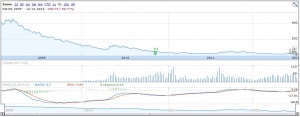Yesterday, I was enlightened by the talking heads on CNBC. Enlightened to their ignorance, I was flabbergasted by the naivete that many of them spew. They were speaking about the new Apple connector, as I listened my draw dropped. They had no idea what they were talking about. Ignorance stems from lacking an understanding of a topic, and when it comes to technology many of the news sources just fail to grasp it, and that is where I grind my ax. It seems more often than not, the more senior group of investors write articles or jabber on the telly about topics that they have no in depth understanding about. Then again that may be why many of these so called “brilliant” investors missed out on some of the stock movements of a lifetime and are rarely positioned for the next “big thing.”
I skimmed an article this morning referencing Zynga and Facebook. This articles suggested that Zynga was merely a company that sent annoying request on Facebook. This individual then continued to define his bullish stance obviously based on his lack of need for their products. I may be a health conscious fellow and avoid eating fast food, but I can still see the need of McDonald’s by many. An intelligent investor can look outside their arena of comfort to see why other companies fill the needs of many. Facebook allows individuals to connect, so the uniformed investing community believes that they are similar to Myspace or AT&T in the 90’s(remember the house phone, the thing that hung on your wall). To put it in terms that many of you will better understand: just because you don’t utilize Facebook, Yelp, Kayak, or Zynga does not mean that the company will not succeed.
Look back to the initial run up of Apple, many of the talking heads suggested that their was no need for any of the products they made. I even recall myself suggesting that a tablet was pure lunacy. Obviously I was wrong in my initial notions. I have since learned from my mistakes and forced myself to think outside the box. So yesterday as Apple announced that they change the adapter on their phone, the inital reation of the talking heads was one enveloped by negativity. Why would they do that? Why would they change things? Won’t this be bad for business? blah blah blah. The transition will in fact set up for ease of use down the road as they set up one cord for the next few generations of phones. Also by allowing for a new connector this will make the new class of iPhones more exclusive. As I have spoken previously, that has repeatedly been one of the issues with apple products, that they were once tiered to a select group and now a majority of individuals have them. Hopefully the new phone will separate the New iPhone users and iPhone 4 users by leaps and bounds, making new apple products exclusive. I digress, the future moves so quickly that many can’t keep up, let alone look down the pipeline to see what is coming. So as an informed investor think outside the box, because when it comes to technology, the older generation repeatedly lacks an in depth understanding.
Sometimes it is better to take the wheel and make grandpa play backseat driver.
Grey Dawn
Get More: SOUTH
PARKmore…
Photo by schnaars








